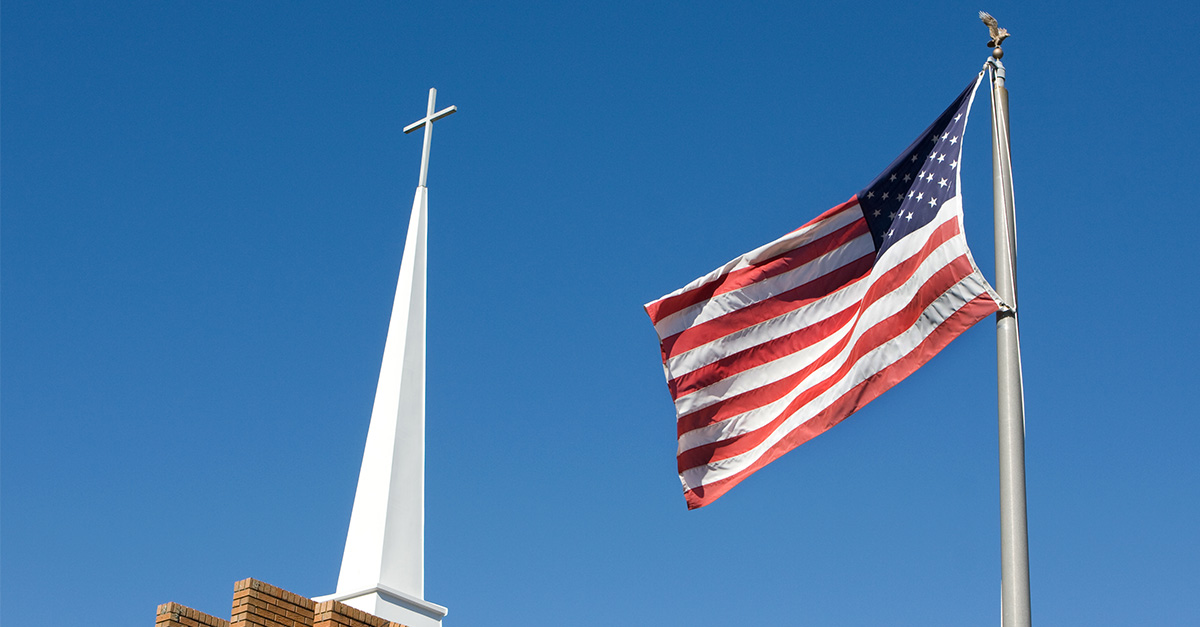


Get a free copy of Parental Rights & Education when you subscribe to our newsletter!

“This is the heart of the issue at hand: For all nations, ultimately, the ‘theological roots’ of political life must be the Christian faith if the nation is to be ordered towards its best ends and ultimate goods. And specifically, in the United States, this is a pre-existing historical reality, though one that has been deeply confused and largely forgotten.”
–WILLIAM WOLFE
In the introduction to A Protestant Christendom: The World the Reformation Made, editor Onsi Kamel remarks that “What becomes immediately apparent in the first section of the book, concerning Church and state is this: classical Protestantism rejects the secular nation.”[1]
Baptist theologian and ecclesiologist, Jonathan Leeman, agrees with this assessment. In his book on politics, How the Nations Rage: Rethinking Faith and Politics in a Divided Age, he argues that “government serves gods. This is true of every government in every place ever since God gave governments to the world…No citizen or officeholder is religiously indifferent or neutral.”[2] He explicitly rejects the notion of a neutral public square, instead calling it a “battleground of gods.”[3]
This a welcome admission from a Baptist theologian, since many Baptists are often uncomfortable admitting that the government will, unavoidably, enforce some kind of “orthodoxy” on the people that they govern. This historic hesitancy on the part of the Baptists is mistaken, for when one undertakes to reason through the nature of law and authority, one cannot help but realize that this is simply a statement of fact. The question is not whether or not a government will enforce a moral standard via laws and customs (and all moral standards are always tied to some kind of religious commitment) but rather which moral standards and customs will be enforced. This is often and neatly summarized in the statement “not whether, but which.”
In our modern (or postmodern) era, many Christians tend to mistakenly equate “secular” with “neutral” and “neutral” with “free.” In other words, they believe that the government is capable of exercising its God-given authority without any reference to God at all! They (wrongly) think that if the government of the United States, for example, acknowledged Christianity as the defining and indispensable religion of America, and that the moral foundations of true justice rest on Christian truth claims, somehow such a declaration would be “coercive.”
But as long as religious liberty exists under such a framework, and the government is not using official power (the sword) to compel its citizens to profess adherence to Christianity, that is simply not so. Citizens can be free even in non-neutral states. In fact, because non-neutral states are all that exist, the question, again, is rather “which non-neutrality,” will we be most free under? Or rather, “which religion” helps the state best secure political order, the pursuit of good ends, true justice, and rightly ordered freedom?
The conceit of modernity is the belief that secularism can provide such a foundation. This is a mirage. At best, secular liberal governments operate on “borrowed capital” from Christianity.
This was the thesis of the German philosopher Ernst-Wolfgang Böckenförde in what is known as the “Böckenförde Paradox” or the “Böckenförde Dilemma.” In his essay “The Origin of the State as a Process of Secularization,” Böckenförde argued “the liberal, secularized state lives on the basis of assumptions that it itself cannot guarantee. That is the great gamble (wagnis) it has made, for the sake of liberty.”[4]
In other words, as theologian James Wood explains, “Liberal societies require a virtuous, and thus religious, citizenry, as many of the Founding Fathers recognized. But, as the Tocquevillians have long argued, liberal societies seem to undermine the very institutions that inculcate such virtue.”[5]
A few of the more prominent Christian (and even Baptist) thinkers of our day are willing to admit this: The modern secular state must not be viewed as a neutral actor. Jonathan Leeman was one example already provided. Andrew Walker, professor of ethics at the Southern Baptist Theological Seminary, has also encouraged Christians not to be fooled. “Secularism is a form of theocracy. It’s very jealous for its own glory, commands our worship, & demands a set of ethics.”[6]
Walker’s point here goes beyond the Böckenförde Paradox (the mere acknowledgment that secular states require religious assumptions to exist) and argues that secularism, particularly the progressive strain that is on the ascendancy in the United States, actually functions as a religion itself, and a totalizing one at that.
While not a Baptist, Lutheran Richard John Neuhaus warned about the same danger in his work The Naked Public Square: Religion and Democracy in America, acknowledging that “A perverse notion of the disestablishment of religion leads to the establishment of the state as the church.”[7]
In an even more comprehensive manner, leading Baptist statesman R. Albert Mohler Jr. recently issued a grave warning about the hidden perils of a seemingly secular state. In a speech to the National Conservatism Conference, Mohler opened by admitting that he wanted to “speak about one of the most dangerous ideas of the modern age.”[8] What is this idea? It is, per his title, the “dangerous illusion of a ‘secular’ state.”[9]
Mohler continues:
“I’m going to argue that what Peter Berger referred to as a sacred canopy, that that canopy of theological fixed meaning that was grounded in some form of Christianity, explicitly when it comes to the American experiment, that that created the space whereby the two principles of the First Amendment of a free expression and no establishment of religion could be adopted.”
This is an important point for Christians and one that Mohler draws out. The conditions which gave rise to the First Amendment, and the ultimate realization of demands for religious liberty and freedom from persecution, which we rightly hold dear, were brought about in a context that could be called a “mere Christendom” — a political order that was founded on Christianity and assumed Christianity as its moral frame of reference. Mohler notes that “the big issue then [around the Founding] was to avoid strife among Protestant sects” and that the goal of foreclosing on a federal establishment of religion (which he opposes as a Baptist) was not “by extension the argument that there was no acknowledgment of religion whatsoever, which is just historically false.”
As he progresses towards the end of his speech, Mohler argues that “To be a conservative is to have to conserve the whole,” adding that “a conservative movement…that does not acknowledge the theological roots of our political life as a nation, is by no means conservative. And such a society, or such an intellectual project, would be unable to sustain a defense of community and nation.”
Take note of that that key phrase in Mohler’s quote — the necessity of a nation acknowledging the “theological roots of our political life.”
This is the heart of the issue at hand: For all nations, the “theological roots” of political life must be the Christian faith if the nation is to be ordered towards its best ends and ultimate goods. And specifically, in the United States, this is a pre-existing historical reality, though one that has been deeply confused and largely forgotten. While Baptists prize our commitment to religious liberty, it must always be set in the context of this incontrovertible historical and political reality. If we reject this, we will be unable to defend or sustain the nation.
Mohler, as he concludes, sounds like Carl Henry though he quotes a Catholic. He closes with the words of John Courtney Murray, who said,
“If the myth of democracy as a religion is triumphant, and achieves its ‘establishment’ as our national religion, the triumph will be over you. Your God will have been supplanted by an idol.”
Mohler, again, agrees: “If the last word is the secular state, then our God is supplanted by an idol.”
As Christians, we should be on the front lines fighting against this threat, working to ensure that this word, “your God has been supplanted by an idol,” is not the last word for our nation. We do so, first and foremost, by unapologetically embracing and advancing the need for an explicitly Christian moral order in America — in our civil laws and social customs.
After all, as Founding Father John Adams warned us, “Our Constitution was made only for a moral and religious People. It is wholly inadequate to the government of any other.”
And what religion was it that he had in view? Christianity.
Follow William on Twitter! @William_E_Wolfe
Ready to dive deeper into the intersection of faith and policy? Head over to our Theology of Politics series page where we’ve published several long-form pieces that will help Christians navigate where their faith should direct them on political issues.
1 Onsi Kamel, ed., Protestant Christendom? The World the Reformation Made (Landrum, SC: The Davenant Press, 2021), xiii.
2 Jonathan Leeman, How the Nations Rage: Rethinking Faith and Politics in a Divided Age (Nashville: Nelson Books, 2018), 23.
3 Leeman, How the Nations Rage, 23.
4 Michael J. Hollerich, “The Böckenförde Paradox,” Commonweal, accessed May 26, 2022, https://www.commonwealmagazine.org/b%C3%B6ckenf%C3%B6rde-paradox.
5 James Wood, “Underwhelmed by ‘America without God,’” Providence Magazine, accessed May 26, 2023, https://providencemag.com/2021/03/underwhelmed-shadi-hamid-america-without-god.
6 Leeman, How the Nations Rage, 42.
7 Richard John Neuhaus, The Naked Public Square: Religion and Democracy in America (Grand Rapids: Eerdmans, 1988), 86.
8 Joe Rigney, “Identity or Influence? A Protestant Response to Jonathan Leeman,” 9 Marks, accessed on May 26, 2023, https://www.9marks.org/article/identity-or-influence-a-protestant-response-to-jonathan-leeman.
9 Albert Mohler, “‘Your God Will Have Been Supplanted by An Idol’ — The Dangerous Illusion of A ‘Secular’ State,” AlbertMohler.com, accessed May 26, 2023, https://albertmohler.com/2022/09/15/natcon-2022.
